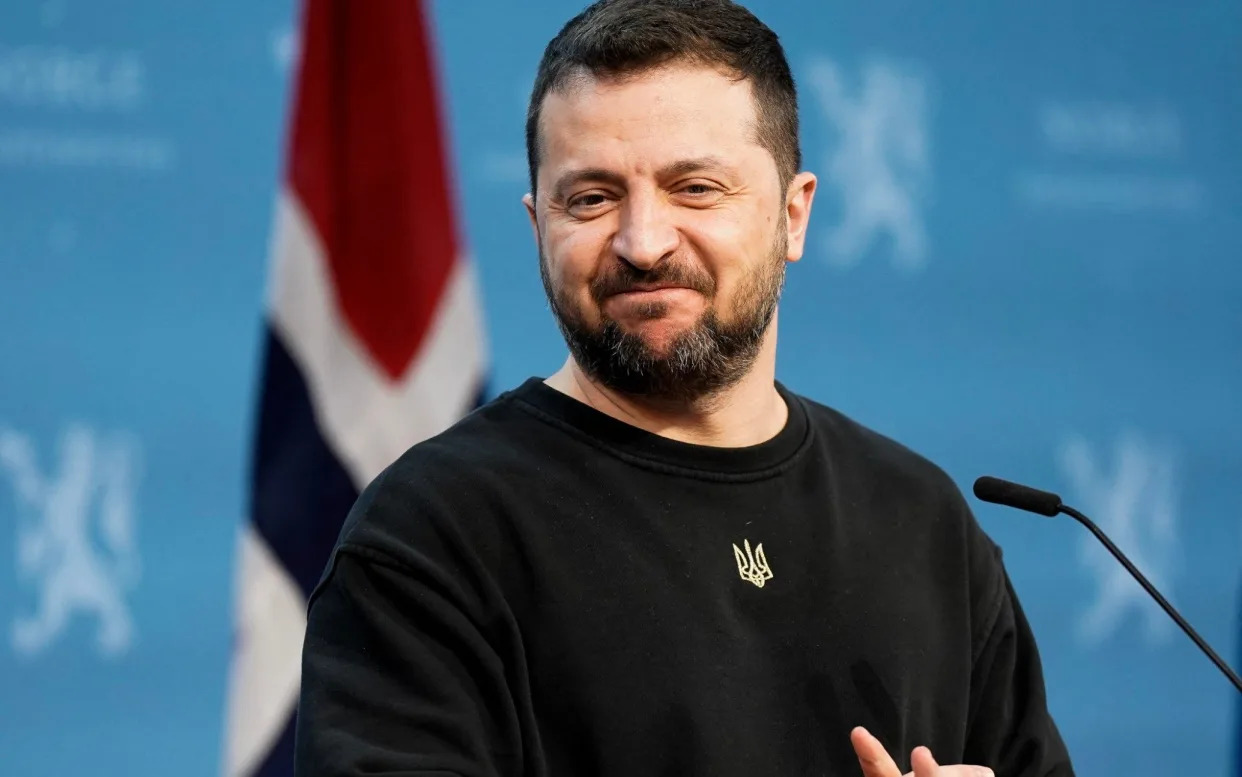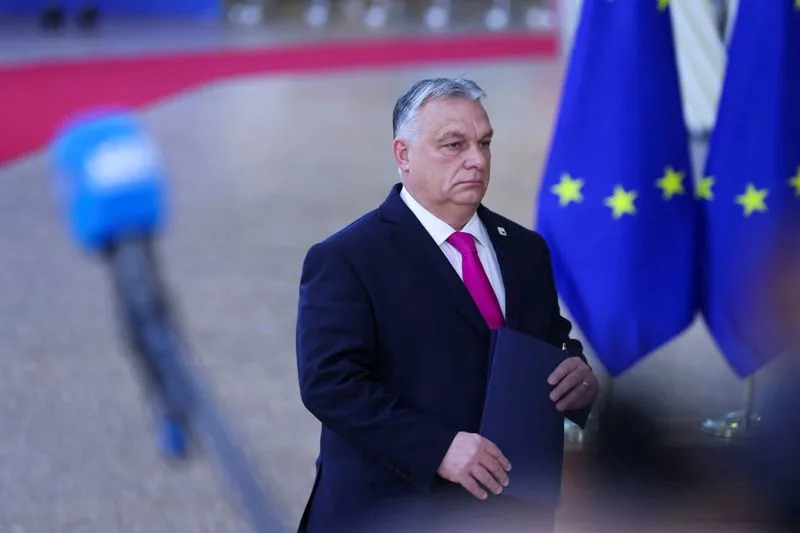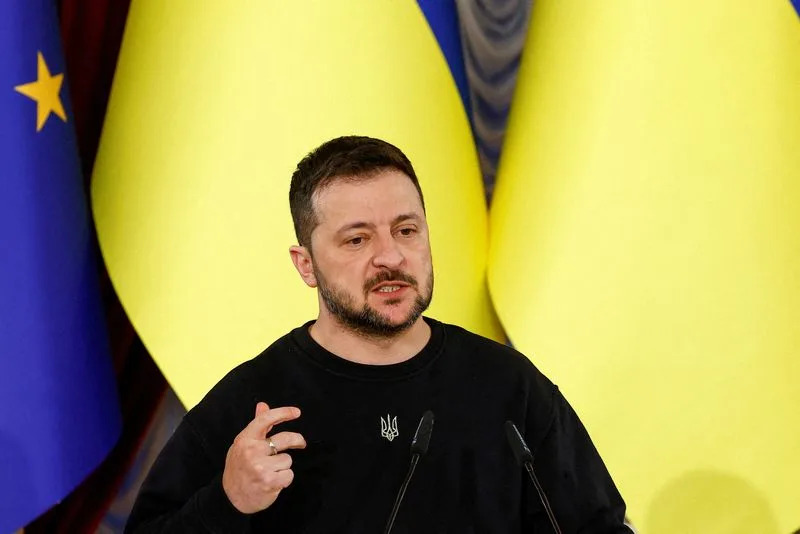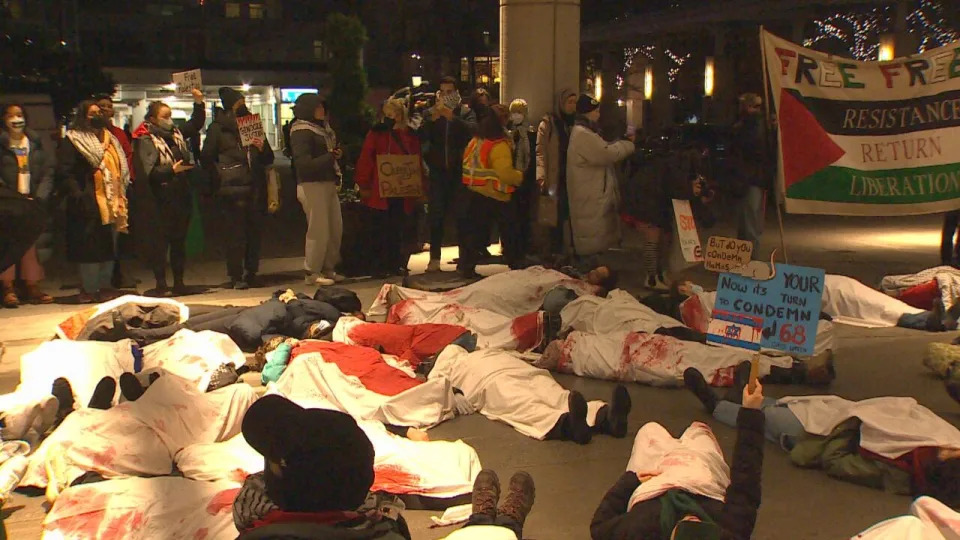Natalia Drozdiak, Maria Tadeo and Alberto Nardelli
Thu, December 14, 2023

(Bloomberg) -- European Union leaders agreed to open membership talks with Ukraine in a historic political win for Kyiv as it grapples with uncertainty over future financial aid from the US and Europe.
“A clear signal of hope for their people and for our continent,” European Council President Charles Michel wrote in a post on X. He said that EU leaders meeting in Brussels also agreed to open accession talks with Moldova, granted candidate status to Georgia and said negotiations could begin with Bosnia once it meets the criteria.
Hungarian Prime Minister Viktor Orban had opposed opening membership talks, saying Ukraine wasn’t ready and the topic should be removed from the summit agenda, prompting frustration in other European capitals.
Read more: What Ukraine’s EU Candidacy Means, and What’s Ahead: QuickTake
Orban wasn’t in the room for the final vote, according to two people familiar with the matter. The decision requires unanimous approval of EU member states, and nobody objected to the decision, the people said. German Chancellor Olaf Scholz suggested Orban leave the room to allow the bloc to move forward for now, one person added.
“Hungary didn’t want to take part in this wrong decision and therefore decided to stay away” from the vote, Orban said in a Facebook video Thursday, calling it a “senseless, irrational, wrong decision” to start EU accession talks.
EU nations also reached agreement on a 12th package of sanctions against Russia, including a ban on Russian diamonds and measures to better enforce the price cap on Russian oil, according to people familiar with matter. The sanctions deal will become official Friday after clearing procedural steps.
While Kyiv still faces hurdles in clinching funding from both the EU and the US, the country’s progress on joining the bloc will at least boost morale as it seeks to fight off Russia’s invasion.
The decision, however, is a somewhat symbolic one. The bloc won’t launch the more formal negotiating framework before March, when Ukraine has been asked to meet several additional conditions related to its membership bid.
Even with a green light from member states, the negotiations would still take years as the path to membership is lengthy and complicated. Croatia was the last country to join the bloc and its application lasted 10 years before it was formally accepted in 2013.
“Membership won’t happen overnight or even in a few years time,” Irish Prime Minister Leo Varadkar told reporters. “But we look forward to welcoming new members in the years ahead.”
Ukraine’s Volodymyr Zelenskiy hailed the decision, saying he wants to thank everyone who worked to make it happen. “I congratulate every Ukrainian on this day,” he wrote on X.
Failing to open accession talks would have been a severe blow for Ukraine, after it invested so much time, energy and reforms in the process. It also could have damaged the EU’s reputation in the country, as the bloc falls short on a key plank of its support.
Ukrainian Foreign Minister Dmytro Kuleba said earlier this week that of all the issues on the table at the summit, opening accession talks was “the mother of all decisions, the most important decision.”
The European Commission, the bloc’s executive, formally recommended in November starting the talks with Ukraine, as well as Moldova. At the time, the commission said it would monitor Ukraine and Moldova’s progress with the aim of reporting back to member states by March.
The commission said that before negotiations could start, Kyiv would need to enact legislation on minorities and corruption, and to regulate lobbying to bring it in line with European standards, among other steps. Kuleba said of the four laws the EU demanded it introduce by March, Ukraine has already signed three of them into law and the fourth would soon be adopted.
--With assistance from Andra Timu, Zoltan Simon, Kateryna Chursina, Katharina Rosskopf, Stephanie Bodoni, Natalia Ojewska, Slav Okov, Michael Nienaber and Jorge Valero.
©2023 Bloomberg L.P.
es to open membership talks with Ukraine
Thu, December 14, 2023

'This day will go down in our history', said Ukrainian President Volodymyr Zelensky - CORNELIUS POPPE/AFP
The EU offered Ukraine the chance to start talks to join the bloc on Thursday after Volodymyr Zelensky warned them that failing to grant Kyiv accession talks would go down in history.
Charles Michel, the European Council’s president, said it was a “clear signal of hope for their people and for our people”.
Speaking ahead of the summit, Mr Zelensky told EU leaders by video link: “Today is a special day. And this day will go down in our history. Whether it’s good or bad for us, history will capture everything. Every word, every step, every action and inaction. Who fought for what.
“Today is the day when determination will either be in Brussels or Moscow. People in Europe won’t understand if Putin’s satisfied smile becomes the reward for a meeting in Brussels.”
The EU’s continued support for Ukraine has become even more vital for the war-torn crisis after the US failed to agree on a $60 billion (£52.7 billion) aid package.
Opposition from Hungary
Viktor Orban, the Hungarian prime minister, arrived at the summit in Brussels on Thursday as the chief opponent to opening talks for Kyiv to join the bloc and a €50 billion financial lifeline.
He argued Ukraine did not deserve to start the negotiations or receive money from the EU’s joint budget.
Hungary has repeatedly delayed the EU’s response to the Russian invasion of Ukraine, opposing moves such as sanctions against Moscow and donations of weapons to Kyiv.
Mr Orban is the only EU leader to meet Vladimir Putin, the Russian president, and to continue to do business with Moscow, despite its invasion of Ukraine.
“There is no reason to discuss anything [on membership talks] because the preconditions are not met,” Mr Orban said.
“In the long term, and the bigger sum of money, my decision is we should give it outside [the budget],” he added on the four-year financial package.
EU leaders arriving at the planned two-day European Council summit said they were ready for lengthy discussions to overcome Mr Orban’s opposition.
Finland’s prime minister Petteri Orpo said: “I’m ready to negotiate. I have packed many shirts if it takes us long.”
He said support for Ukraine was crucial to “our security and existence as a credible union”, adding: “We need strong resistance here. We have to show our unity.”
‘Endangering Europe’s future’
Evika Siliņa, the Latvian prime minister, suggested the bloc could not rely on “someone who is endangering Europe’s future” in a veiled dig at Hungary.
“Maybe there is a moment we have to negotiate – not anymore about Ukraine, but someone else who is not going forward,” she added.
Leaders of the 26 other EU countries were largely supportive of starting membership negotiations with Ukraine and the financial package.
On Wednesday, the European Commission released €10 billion to Hungary that had been withheld over the state’s alleged erosion of democracy, despite opposition from EU figures.
It was hoped the money, about a third of frozen EU funding to Budapest, would have helped ease Mr Orban’s opposition to Ukrainian aid.
Hungary did not meet preconditions
The Hungarian prime minister’s political director earlier this week suggested it would take €30 billion to change his mind on the financial package proposed for Ukraine.
“I always have some difficulty with such a summit where one person thinks we can offer all kinds of things,” Mark Rutte, the Dutch prime minister, told reporters.
“We set up seven preconditions, and in the evaluation of the Commission, three out of seven were not fulfilled, so there is no reason to discuss anything because preconditions were not met. So we have to come back later on, revert to that issue again when it is fulfilled by the Ukrainians,” he said.
In its recommendation to EU leaders, the Commission proposed officially adopting a negotiating framework in March next year, potentially giving time for Ukraine to meet the remaining demands for reforms.
Meanwhile, Austria also appeared as a potential roadblock on Ukraine’s EU membership, demanding Brussels does not fast-track Kyiv’s negotiations at the expense of six Western Balkan states hoping to join the bloc.
Diplomatic sources said Italy had also tied demands for more spending on migration to cash for Ukraine.
Hungary against EU talks with Ukraine, open to financial aid for Kyiv
Reuters
Thu, December 14, 2023

European Union leaders' summit in Brussels
BRUSSELS (Reuters) -Hungary could back granting long-term financial aid to Ukraine outside of the European Union budget, Prime Minister Viktor Orban said on Thursday, while reiterating his opposition to start accession talks with Kyiv.
Orban spoke on arriving to a summit of EU leaders, where all other EU countries want to provide Ukraine with 50 billion euros ($54.50 bln) in budget support through 2027, and advance Kyiv's membership bid as the country's war with Russia drags on.
Those decisions require unanimity among the bloc's 27 member states, something Orban has ruled out.
Orban said there was no time pressure to decide on more financial aid to Ukraine because short-term support was already secured. For longer-term backing, he said it needed to be fixed outside of the bloc's joint coffers.
"We have to manage this outside of the budget. And we support it," said Orban.
He also said Ukraine had not met all of the 7 conditions the EU had set to launch accession negotiations.
"There is no reason to discuss anything because preconditions were not met. So we have to come back later on, revert to that issue again when it is fulfilled by the Ukrainians," Orban said, adding that "we are not in a position to start to negotiate".
Speaking on Wednesday, the EU's chief executive said reforms passed in Ukraine last week meant Kyiv now met 6 out of those 7 conditions, with the only outstanding requirement being a new law on lobbying to limit oligarchs' influence in the country.
EU officials and diplomats suspect he is using the issue of support to Ukraine as a bargaining chip, hoping to obtain funds frozen by the bloc over concerns about the rule of law in Hungary. Orban said on Thursday there was no link.
He also mentioned a continent-wide European Parliament election next June, saying the bloc should "behave democratically" and await a new political consensus that would emerge, potentially signaling a months-long delay to any start of talks to Ukraine.
($1 = 0.9175 euros)
(Reporting by Krisztina Than, Bart Meijer, Writing by Gabriela Baczynska, Editing by Charlotte Van Campenhout)

Politico: Zelensky not invited to EU summit to avoid antagonizing Orban
Elsa Court, The Kyiv Independent news desk
Thu, December 14, 2023
President Volodymyr Zelensky has not been invited to the EU Council Summit in Brussels due to fears that his presence "could antagonize" Hungarian Prime Minister Viktor Orban, Politico reported on Dec. 14, citing unnamed EU diplomats.
Orban openly opposes the launch of Ukraine's EU accession negotiations, claiming that Ukraine is "light years" away from joining the block. The European Commission announced on Nov. 8 that Ukraine had made progress in its reforms and was ready for talks to begin.
Member states will vote on whether to officially begin negotiations during the Dec. 14-15 summit. Ukrainian and Western leaders and officials are seeking to sway Budapest away from blocking the start of Ukraine's membership talks.
Zelensky was in Oslo on Dec. 13, a few hours away by plane, and was "keen" to come to Brussels, Politico's sources said. EU leaders were also reportedly "willing to invite him."
The president did not receive an invitation since "several ambassadors expressed reservations," fearing that his presence would cause Orban "to dig his heels in even further," Politico said.
The Hungarian prime minister said on Dec. 14 that there is "no reason to negotiate the (EU) membership of Ukraine now," signaling no change in his position.
European Council President Charles Michel, European Commission President Ursula von der Leyen, and French President Emmanuel Macron were set to meet with Orban ahead of the summit in what appeared to be a last-ditch attempt to persuade Orban to change course.
Ukraine's Zelenskiy hails 'victory' after EU decision to open accession talks
Updated Thu, December 14, 2023

By Tom Balmforth and Yuliia Dysa
(Reuters) - President Volodymyr Zelenskiy hailed a "victory" for Ukraine and the European continent on Thursday after European Union leaders agreed to open membership talks for Ukraine and Moldova despite months of opposition from Hungary about Kyiv joining.
The decision announced by European Council President Charles Michel on the first day of a summit in Brussels is a much-needed morale boost for Kyiv, which fears vital Western support has been waning as its war with Russia rages on with no end in sight.
"I thank everyone who worked for this to happen and everyone who helped. I congratulate every Ukrainian on this day... History is made by those who don't get tired of fighting for freedom," Zelenskiy wrote in a post on social media platform X.
In a separate post on X, the president added: "This is a victory for Ukraine. A victory for all of Europe. A victory that motivates, inspires, and strengthens."
Zelenskiy later issued a series of messages on Telegram, thanking Council President Michel for communicating the result personally and expressing gratitude to European leaders.
These included French President Emmanuel Macron and German Chancellor Olaf Scholz, who met Hungarian Prime Minister Viktor Orban before the result was announced.
He congratulated Moldovan President Maia Sandu on her country winning the right to launch talks and President Salome Zourabichvili on Georgia becoming a candidate for EU membership.
Kyiv residents were delighted at the EU summit outcome.
"Ukraine showed that it has qualities that make it different from our enemy," said Volodymyr, 63.
"When people don't like something, they express their will and change presidents. This movement is ceaseless since 2004, Ukraine was and is heading towards Europe."
It was not immediately clear what the fate was of a four-year 50 billion euro aid package that Kyiv hopes will also be agreed by EU leaders at the summit this week.
WARTIME MEMBERSHIP BID
Ukraine announced its wartime bid to join the EU days after Russia launched its full-scale invasion in February 2022.
"This is an extremely important milestone on our common path to the unification of Europe... When we started it, no one believed we'd succeed. But we didn't care," Zelenskiy's chief of staff Andriy Yermak said.
Kyiv has been racing to adopt legislative reforms in recent weeks to meet the criteria for launching talks, but had faced staunch opposition from Hungary's Orban.
Ukrainian Foreign Minister Dmytro Kuleba said: "What a historic day! One emotion dominates: everything was not in vain."
Deputy Prime Minister Olha Stefanishyna said: "(This) became possible only thanks to the strong will of all Ukrainians, our soldiers standing on the frontline."
Russia, which has occupied more than a sixth of Ukraine's territory, is a fierce opponent of Ukraine's push to join Western institutions like the NATO military alliance.
Moscow's troops seized and annexed the Ukrainian peninsula of Crimea in 2014 following mass protests in Kyiv that toppled a Russian-backed leader who had abandoned a push to sign an association agreement with the European Union.
Moldova, which lies between Ukraine and Romania, hailed the EU decision to open formal accession talks with it. Pro-Western President Sandu said Moldova would rise to the challenge and was committed to the "hard work" that lay ahead.
"Moldova turns a new page today with the EU's go-ahead for accession talks. We're feeling Europe's warm embrace today. Thank you for your support and faith in our journey," Sandu wrote on X.
(Reporting by Yuliia Dysa and Anna Voitenko; writing by Tom Balmforth; editing by Mark Heinrich and Rosalba O'Brien)
Zelensky addresses EU summit, warns against 'indecision'
Martin Fornusek
Thu, December 14, 2023 at 6:06 AM MST·2 min read
Ukrainian President Volodymyr Zelensky called on EU leaders to act decisively for Ukraine in a video address to the European Council summit. The Dec. 14-15 meeting is expected to bring about decisions on $54 billion in the bloc's funding for Kyiv and Ukraine's accession negotiations.
The results of the upcoming talks remain uncertain as Hungarian Prime Minister Viktor Orban, who is considered close to Moscow, said he would block the start of the negotiations and has long opposed military support for Ukraine.
"This day will go down in our history. Whether it's good or bad for us, history will capture everything. Every word, every step, every action and inaction. Who fought for what," Zelensky said, according to the Guardian.
"It's very important that Europe doesn't fall back into indecision today. Nobody wants Europe to be seen as untrustworthy. Or as unable to take decisions it prepared itself."
Zelensky stressed that Ukraine passed key reforms necessary on the country's path toward EU integration.
European Commission President Ursula von der Leyen praised Ukraine's reform efforts in a speech on Dec. 12, saying that the country is well on its way to fulfilling the remaining recommendations listed during the November assessment.
Orban was more skeptical about Ukraine's progress, noting that the country has not completed three of the seven criteria set by the EU and that any further decisions should wait until all conditions are met.
"I ask you one thing today – do not betray the people and their faith in Europe," Zelensky told EU leaders.
"If no one believes in Europe, what will keep the European Union alive?"
According to European Pravda, the possibility of Zelensky's personal visit to the summit was discussed as the president toured several partner countries in recent days.
His participation has not been officially confirmed.


















